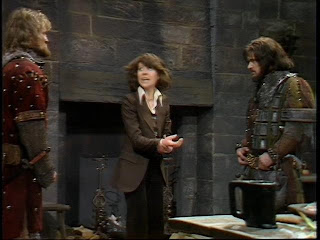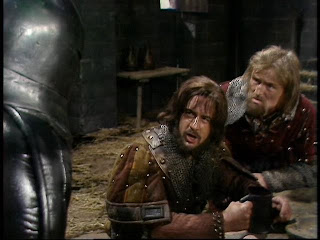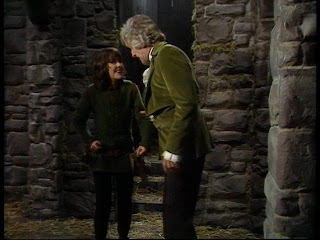Spoilers, I guess. This is one of the most famous of all Doctor Who stories, particularly for two elements - its villains and its ending, and it is, of course, those aspects that everyone talks about. If, by some chance, you haven't watched Earthshock and don't know either the identity of the antagonists or the finale of the story, it's worth trying to see it without knowing anything in advance. The first episode is carefully constructed to avoid the identity of the villains, and the ending will have a much greater impact if you don't know it ahead of time. Of course, it's near impossible to avoid those, but hey, just in case you're that one person who is unfamiliar with it, this is one of the most important Doctor Who stories, and in most ways an excellent one, and has two strong surprises.
You have been warned.
With Earthshock, producer John Nathan-Turner, writer Eric Saward, and director Peter Grimwade set out a hugely ambitious goal: to essentially make a spectacular sci-fi action movie on a few hundred thousand bucks and six days of filming. And, amazingly, they pretty much pulled it off.
Earthshock doesn't feel like most other Doctor Who stories from its era. It's much tighter and more quickly paced, first of all. Doctor Who tends to be a bit slower, which is generally fine, as that allows for more characterization and world-building. But having something so taut and thrilling particularly in a season with quiet stories like Kinda and Black Orchid makes a huge impact. After the first episode, which is an excellent piece of suspense-building, the story rarely slows down; even scenes without violence are tense with the omnipresent threat of violence. There's not as much action as there seems to be, but the intense feeling of constant action is what counts.
The first episode doesn't give away the villains until the final two shots; in the meantime, we're stuck in claustrophobic caves, alternating between the TARDIS crew and a group of soldiers finding their body counts steadily increasing as they look for missing comrades. These are atmospheric, eerie scenes, particularly when the characters run across the remains of some of their fellows reduced to horrific puddles of liquids.
After some searching, they discover the culprits: mysterious black androids. These are simple but creepy creations, and add even more to the escalating suspense of the story, but they're just a decoy to keep us busy until the real villains appear:
Part of the intensity comes from Saward's portrayal of the Cybermen. It's easy to criticize where he failed: he gives them none of the overriding creepiness of the central concept, of humans who have essentially replaced their entire beings with robotics. Nor does he make them emotionless; as he points out, it's very, very difficult to make conflict dramatic and interesting when the antogonist lacks emotion, and while it isn't impossible, Saward goes for a different approach.
But what he gets absolutely, stunningly right is making them genuinely threatening, more threatening than perhaps they've ever been. They may not have the elements that make them really unique in place, but taken simply as unstoppable killers, they're truly frightening. Sure, they could be any overly emotional robotic army, but that doesn't make them any less threatening. These are violent, vicious metal creatures intent on and capable of all manner of murderous assaults.
Their redesign does them credit, as well. In many past appearances, they looked cheap and silly; here, they look much more convincing than before. JNT's concept of their mouths being semi-visible does give the one indication of their former humanity that works.
David Banks' performance as the Cyber Leader adds a lot to their menace. Saward's dialogue for him is silly and over-the-top, but Banks plays the hell out of every word, and exudes power and evil.
Saward structures the story superbly, keeping things constantly moving and filling the story with action and incident. He also does a good job giving Davison strong material as the Doctor; good lines, nice touches of eccentricity, and an awesome scene where he gets a Cyberman literally stuck inside the atomic structure of a door.
 |
| "I want to announce my PRESENCE! And see what the reaction is." |
Adric gets some of the best material he ever got. He had an unfortunate run of stories where he was more a hindrance than a help, and he can easily get annoying, but here, he's at his best: a kid trying as hard as he can to really be helpful. He's also a lot less obnoxious than usual, and is actually rather likable. Matthew Waterhouse is pretty appealing with material this solid. And it's a good thing, too, because there's a real payoff for all that...
Tegan is also well used. Early on, of course, she mostly just complains and such, but this is the story where she finally decides to be more than, as she so accurately describes, "a mouth on legs," and jumps into the fray, picks up a gun, and starts blasting the hell out of the Cybermen. It's the height of her character.
For all the material he gives to the lesser companions, though, Saward, drops the ball on the useful one. Early on, Nyssa is both cool and kind-hearted, but after about an episode and a half, Saward can't think of anything else to do with her (including, I don't know, give her a gun, too?), and just sticks her in the TARDIS doing nothing for the last two-thirds of the story. That's sort of the problem with having three companions; unless you're extremely clever, one of them is going to get shunted to the side. Of course, in the '60s, they usually stuck Susan to the side, which worked out just fine since she was the least helpful. For some odd reason, though, in the early 80s, it's Nyssa who gets screwed over more than anyone despite actually being far and away the best companion of the group. That said, she does get a few good moments here and there, including a good moment at the end.
 | |
| It's mostly just this, though. |
Still, that aside, Saward creates a gripping piece of episodic television, ramped to full power by Peter Grimwade's direction. The action is well-directed, the atmosphere extremely tense, and the production vastly more expensive-looking than it actually is.
Davison is predictably excellent. He's never anything less than terrific in the role, always pouring everything he has into it. Davison makes his bad lines good, his good lines great, and his great lines works of wonder.
Waterhouse, again, is unusually good. Janet Fielding is at her zenith as Tegan. Sarah Sutton... well, her material's pretty lousy. She's good in the first episode, where she gets to do stuff. She's pretty flat in the rest, but you really can't blame her.
The supporting actors generally do good jobs. Beryl Reid is a bizarre choice for the role of a hard-nosed spaceship captain, but she gives such a good performance it's hard not to have fun.
The story rockets along through its second and third episodes, with successively awesome cliffhangers. I've said before and I'll say it again, Cybermen make for terrific cliffhangers. The fourth episode slows just a bit on the action for the sake of tense stand-offs. The conflict between the Doctor and the Cyber Leader is melodrama slammed across with conviction.
And then, of course, there's the ending, which finishes the story with a tremendous emotional punch. Adric's death is superbly handled by Saward: it's heroic, yes, but it also comes from Adric's personality, both good and bad. He's self-absorbed and invicible-feeling, like any teenager, and is, of course, a genius at math. And he wants desperately to be helpful. All these lead to him making a fateful decision that, ultimately, leads to that final tragic moment.
... but even for Doctor Who, there are a lot of plot holes. These aren't too noticeable until the last episode, when the overall plot is revealed, but even a moments thought and the entire story falls to pieces. If the Cyberman could sneak a bomb onto Earth without it being noticed for weeks, why would their back-up plan be such a ridiculously convoluted scheme to steal a freighter for a suicide bombing? The cliffhanger at the end of episode 3 is tremendous... but why would they put an army of ten thousand Cybermen on a suicide bomb?
Once it's all out in the open, the plotting is completely incoherent. It's like Saward dashed off an awesome rough draft, and then decided not to read over it or even spell-check it, probably.
My heart tells me that this is a terrific yarn, full of drama and action, and one of the great Doctor Who stories. My brain tells me it's 90 minutes of incoherent, senseless fury, done with low-budget style. I guess, in the end, I'm listening to my heart and saying this is great stuff, but not without some massive flaws.
RATING:
* * * ½
- The alternate CGI effects on the DVD are brilliant; they fit in so well you wouldn't even know they were there if you hadn't seen the original versions. The laser beams are vastly improved, but still look like the product of 80s television. But the big difference is during the climax, as the freighter hurtles toward the Yucatan. First off, it actually is the Yucatan. But it's much better than that: in the original, we just saw a quick model shot of the ship blowing up. Here, we see it falling toward the earth and the giant explosion that ensues. The Earth looks very similar to the original, and the effects honestly don't look like anything that couldn't have been accomplished in 1982 with just a little more time and money. For any of the CGI alternate effects that I complain about, I hold these ones in the highest regard.
- Okay, one thing I'm really not clear on: why, exactly, does the freighter fly back in time? There's so little technobable explanation that the actual reason seems kind of in the air. I'm pretty sure that it's the Doctor himself who sets all this up, for several reasons. First, it's way, way too big a coincidence for the ship to just happen to travel back to the very conversation the characters were having at the beginning. Second, the Doctor really does seem to have a plan going, and while it doesn't go perfectly, I'm pretty sure from Davison's performance and the way the scene is set up that it really is the Doctor himself turning the Freighter into the K-T Extinction Event. Third, otherwise it just doesn't make any sense. But the thing is, it's never explicitly stated, and this isn't a script terribly strong on subtlety. I like my theory a lot more than anything else, but I do wonder if it is just me throwing a theory where it doesn't belong.




















































